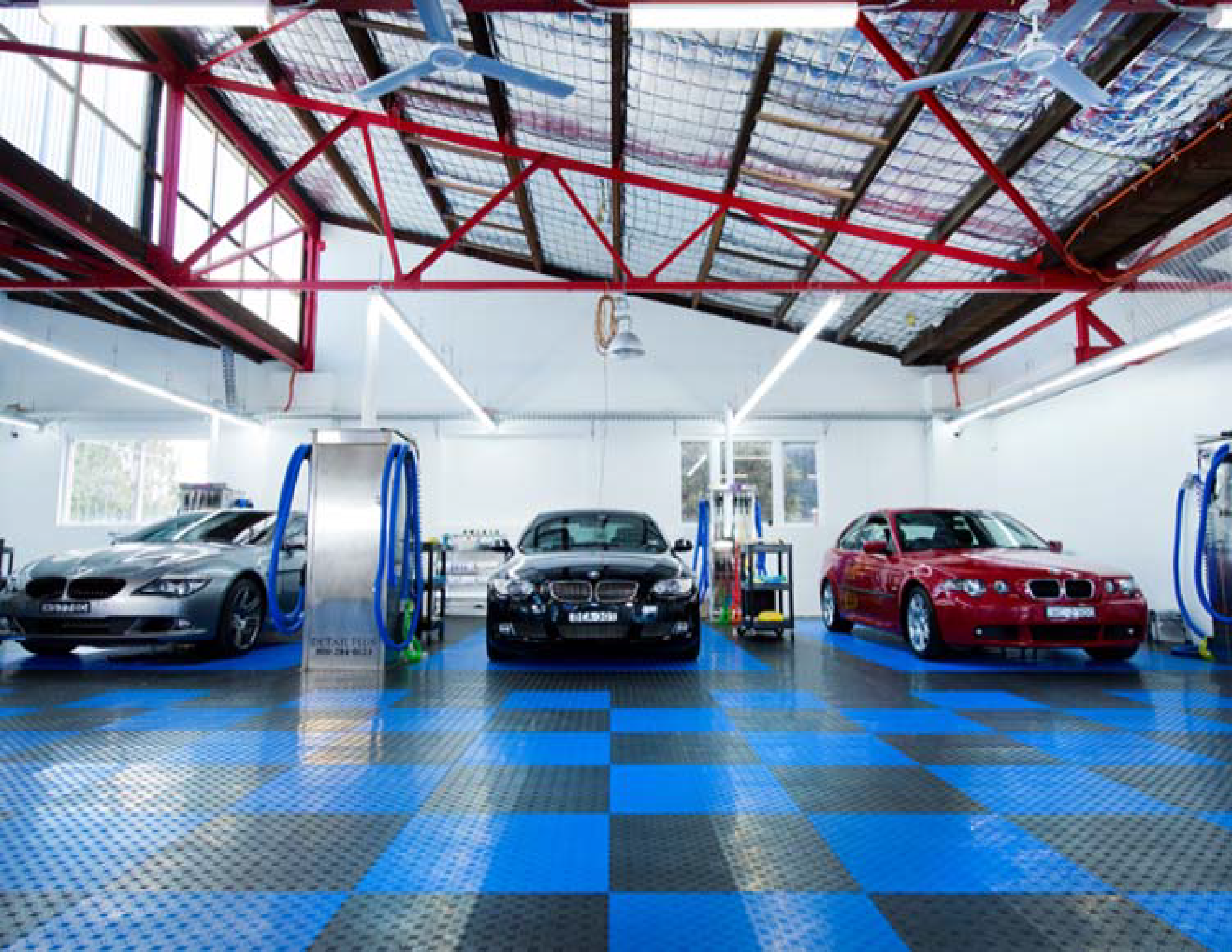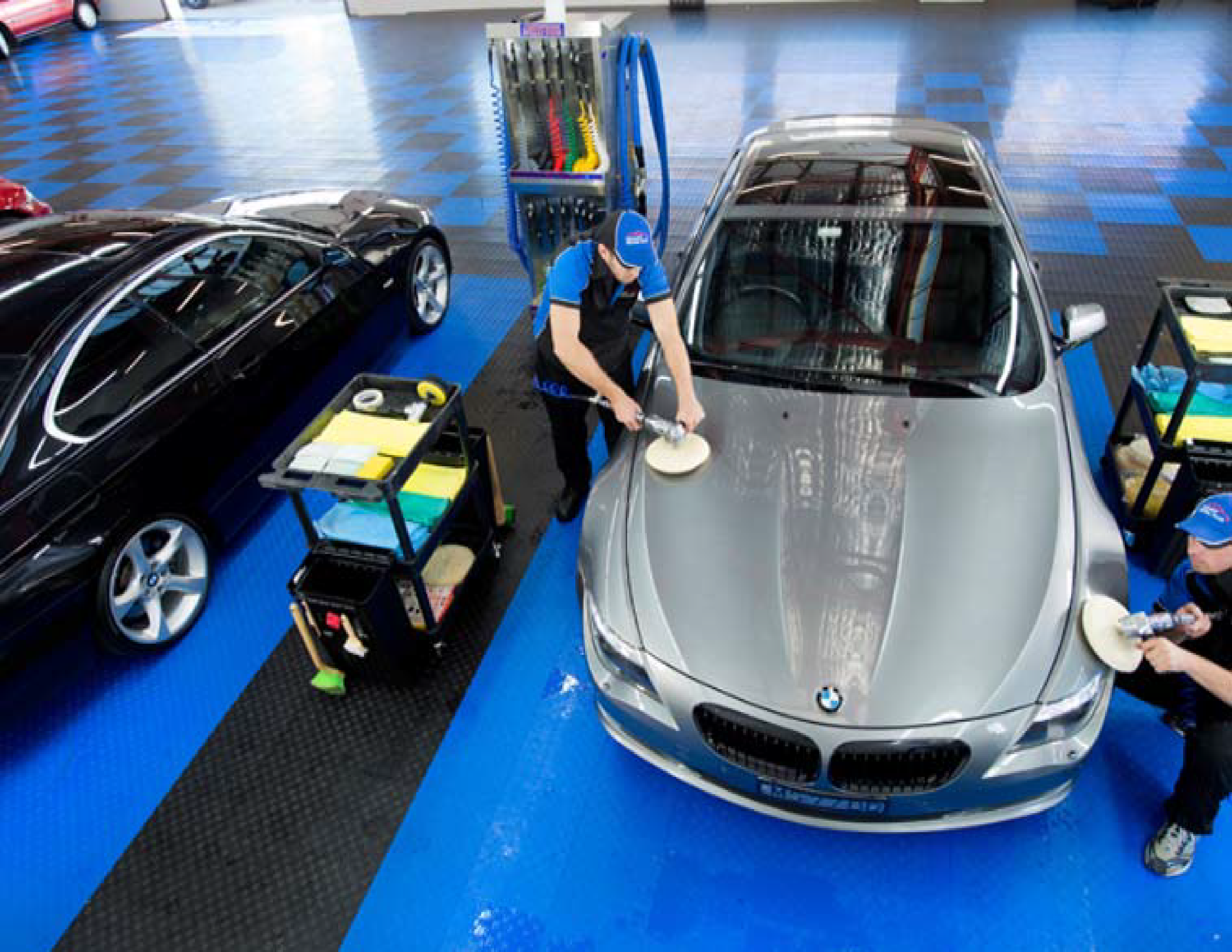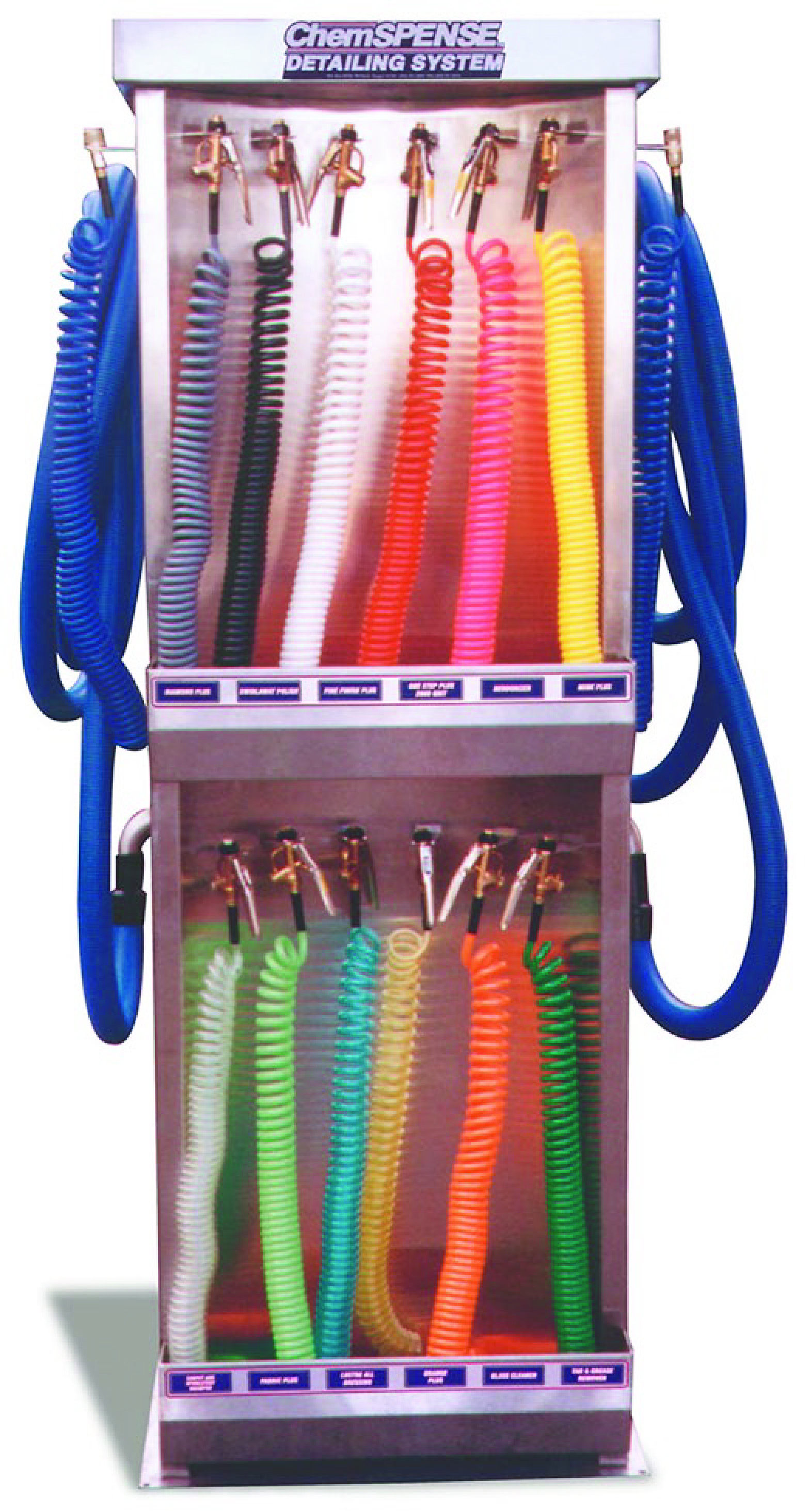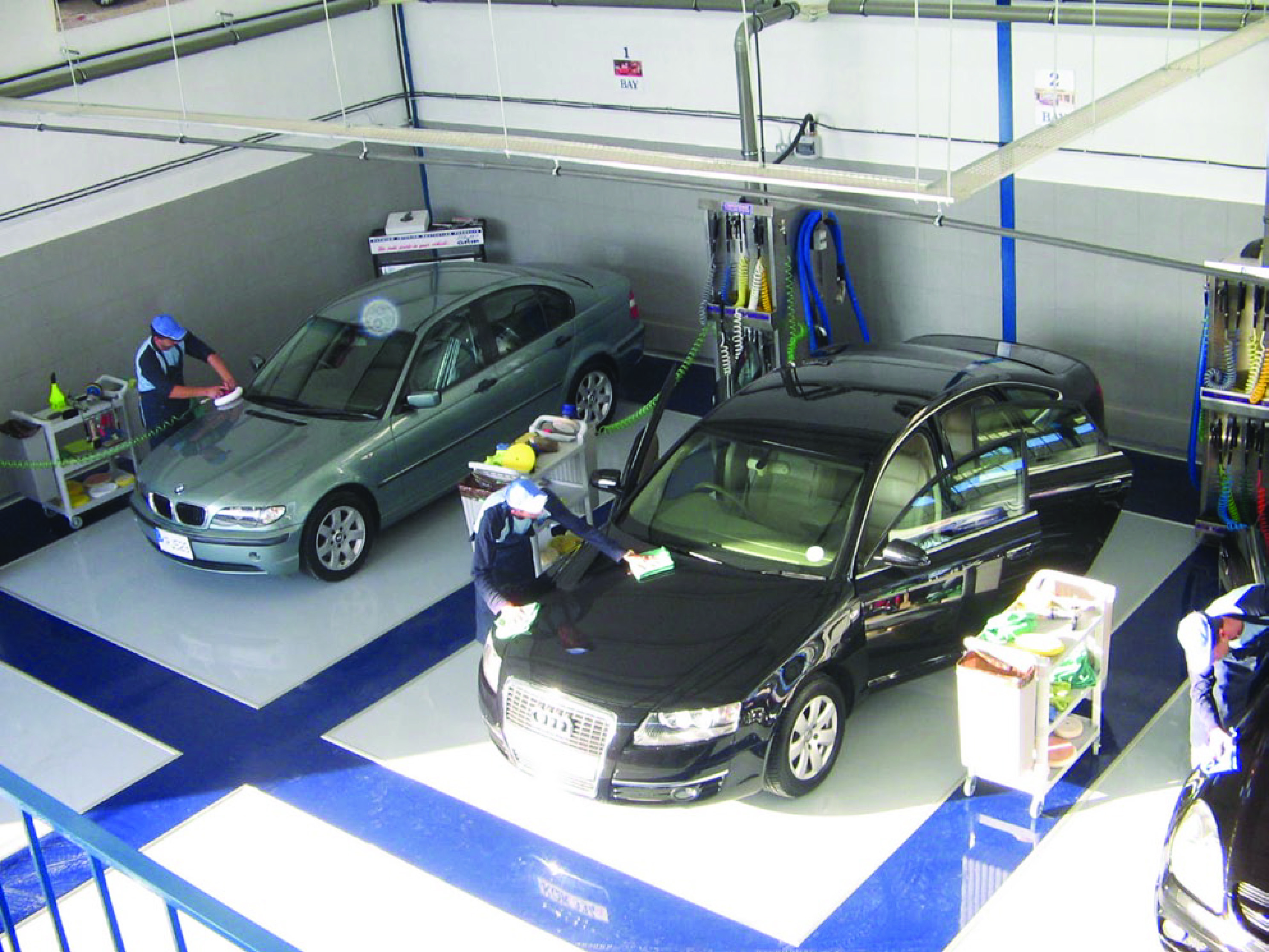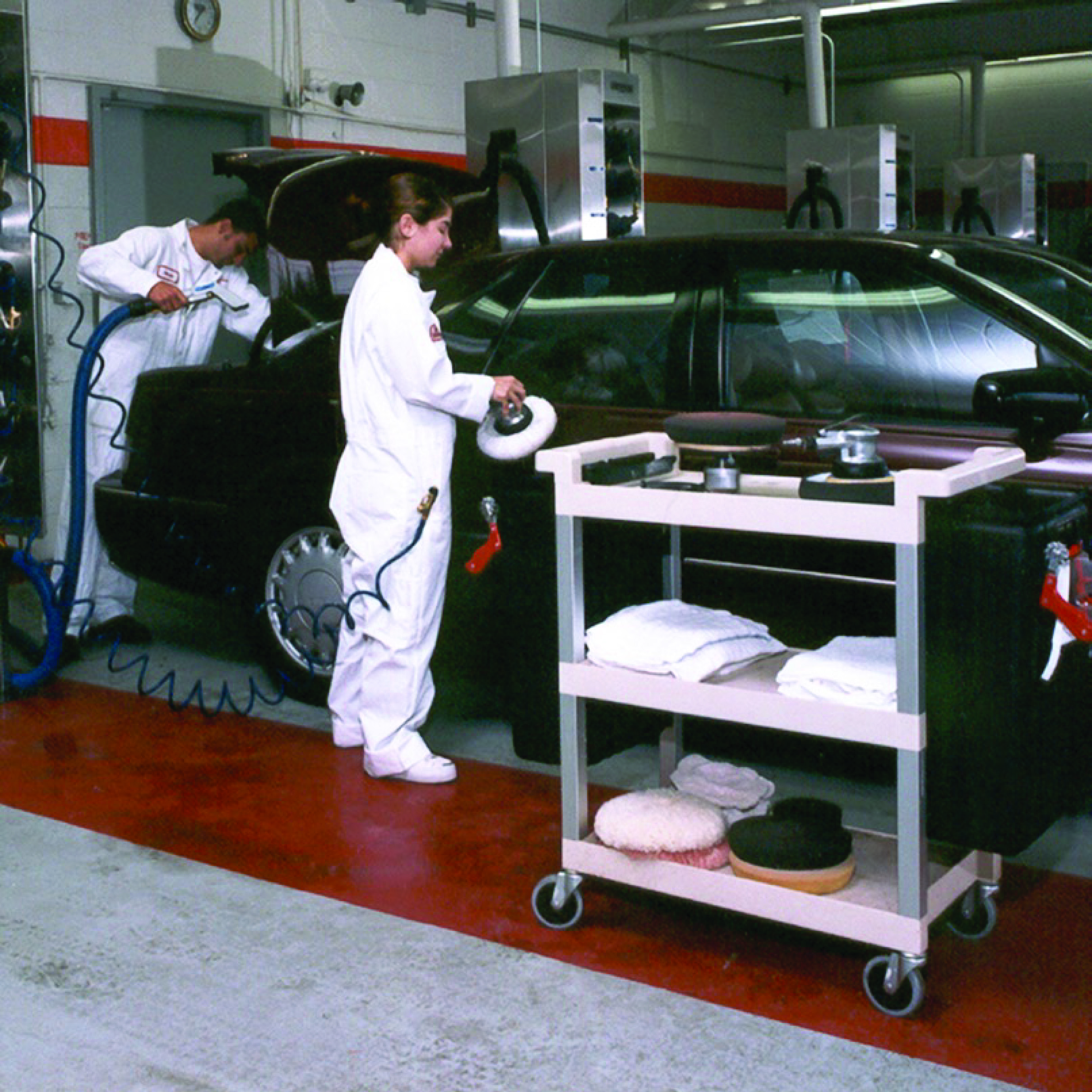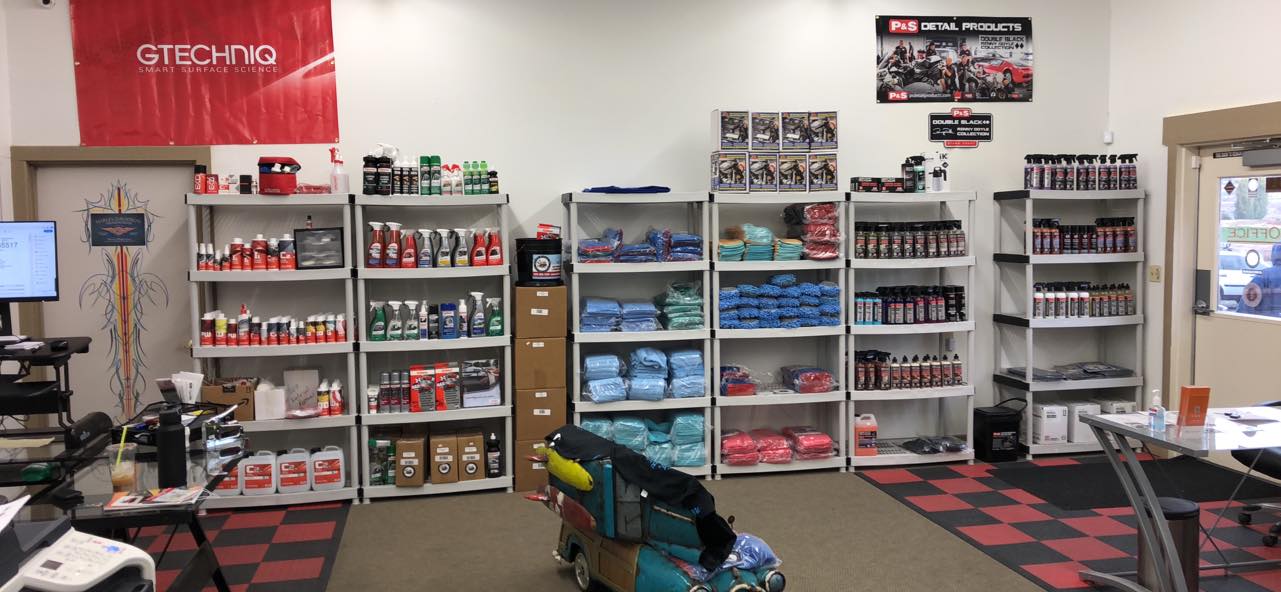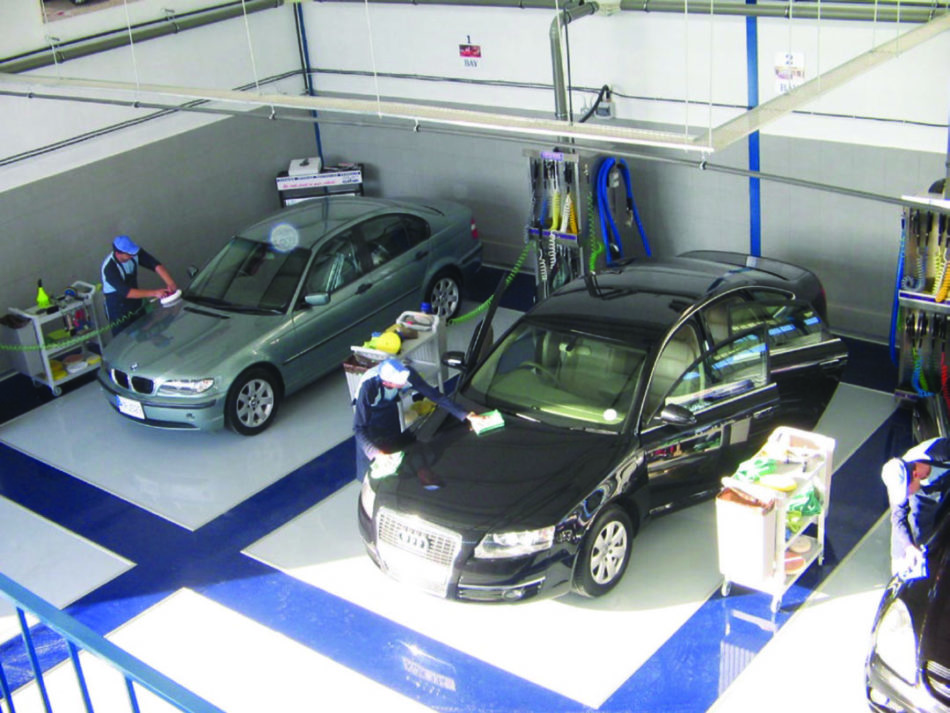
EQUIPPING THE DETAIL CENTER
Professional Detailing Equipment can be a Labor-Saving, Image-Building Investment…
By Bud Abraham, Detail Plus
A well-organized detail shop not only portrays a professional image. It increases productivity while reducing labor costs.
As auto detailing moves from the back alley, bucket-and-sponge wholesale business of yesteryear to the legitimate retail business of the modern era, it carries with it certain responsibilities. No longer, for example, can workers be paid under the table or under the guise of “contract labor.” You can no longer get by with little or no insurance. Owners must seek out retail locations equipped to meet government environmental regulations for the discharging of effluents. In short, as a detailing business matures, it creates higher costs of operation for the operator.
The Largest Expense
In the detail business, the greatest expense, as in most service businesses, is labor. In fact, more than most businesses, auto detailing is very labor intensive. And, like most businesses faced with labor costs, the key to growth and to greater profits is how well labor can be controlled and reduced.
A Typical Detail Operation
If you take an analytical look at a typical detail operation, you will discover a number of labor-wasting operational methods.
- Squeeze-and-Spray Bottles: During the course of the work day, these 12 to 32-ounce bottles must be constantly filled and refilled, taking the detailer away from his work, not to mention the number of times the sprayers break and have to be replaced. And on top of that, it is virtually impossible to keep the bottles organized.
- Portable Vacuums: A typical detail shop may have only one or at most two portable vacuums that are often under capacity to suck up shampoo and dirt. With only one or two available vacuums, workers will be waiting to use the unit(s), or they will have to leave the work area to find the vacuums.
- Electric Buffers and Orbitals: Most shops use electric power tools for buffing and waxing the vehicles. This means time spent locating and then waiting for the tools, finding and plugging in extension cords, tripping over the cords, etc.
General Organization
Shops that operate with squeeze-and-spray bottles, portable vacuums, and electric tools often share one thing in common: A general disorganization that wastes valuable and expensive labor. The locating of and accessibility to buffing pads, towels, brushes, razors and other necessities of detailing often distracts the detailer away from his work.
This is not to say that a shop cannot be organized, but at what expense? If the manager spends time keeping the shop organized, he’s losing valuable minutes away from generating sales and monitoring employee production and work quality. And if you hire a person at minimum wage to keep the shop and tools in order, your costs will be excessive and outweigh the benefit.
Organization Equals Image
Focusing on a labor-saving organization is a question of public image. What does a customer driving a $30,000 to $75,000 car expect from the detailer to whom he entrusts his vehicle? Obviously, that customer wants to see competency and professionalism. Do you have spray bottles lying around, cords strung all over the floor, towels and rags here and there? Does this convey a professional image? Not at all! It shows lack of organization, which reflects poorly on your business.
Let’s look at a couple of examples of good organization in related businesses. One you likely know well is the car wash. What is the biggest operational expense? Once again, labor. And how is it controlled? With equipment and organization.
Carwash operators continually strive to find equipment which washes and dries a vehicle with the least possible amount of prepping and hand drying. Computer systems control almost every operational and financial aspect of the business. Why? To control labor and provide better organization. And chemical dispensing systems have been developed that require nothing more than sticking a tube into a barrel.
Step back and ask yourself: If you were going into the carwash business today, would you do it using hoses, buckets, hand mitts and towels? I think not.
For the second example, let’s look at the quick-oil change and lubrication business. Would you consider going into this business with a simple pit in the floor, a few hand tools, grease guns and cases of oil? Of course not. You would build or lease a multi-bay building with a full basement pit, sophisticated oil and grease pumping devices and all the other machinery needed to operate a professional business.
Is the detail business any different? It is not. The auto detail business, like any other legitimate retail business, has definite professional requirements. If these requirements are ignored, then operators will be unable to maximize their potential.
The Case for Professional Equipment
What qualities make up a professional detail center? The obvious answer is professional equipment. Certainly, there is more to it than that, but equipment is a major factor. Why? Because it makes a major contribution toward organization. Like automatic carwash equipment, professional detailing equipment reduces the management of “things” to a few minutes in the morning and in the evening. More or less, it “automates” the detailing process for the detailer and maximizes his effort.
Visualize an Operating Room
Before a surgeon enters an operating room, it is completely set up. Everything the doctor will need to perform surgery is in place. Once the patient is on the table, the surgeon begins work and stays with it until it is finished. Can you imagine that surgeon leaving the operating table to get a scalpel, suturing thread or sponge?
Once a car is in the work bay in a detailing center, this should happen: Everything required to do the job should already be in place. In this way, you can obtain assembly-line performance from your detail employees.
A chemical dispensing system is a wise investment. It reduces labor costs and improves employee productivity, while also elevating a detail shop’s level of professionalism.
The Dispensing Work Station and Chemical Control Unit:
The operational concept behind the Dispensing Work Station is to put everything needed in the detailing process at the attendant’s fingertips. A typical workstation should include:
- 8 to 12 different chemicals dispensed through individual hose lines.
- Two compressed-air lines.
- Vacuum with two hose drops.
- Electrical outlets.
The Chemical Control Unit is usually comprised of a series of five-gallon chemical holding tanks and an air regulator manifold that controls the flow of air to each tank. The chemicals are moved in overhead lines to each dispenser. All the manager has to do in the morning is fill the tanks and switch on the air pressure.
With chemicals stored in bulk tanks and dispensed through lines and application valves, the need for messy squeeze-and-spray bottles is eliminated. The compressed air provides the power for pneumatic tools, which offer many advantages over the standard electric tools. They are lighter and less bulky to handle, they have a longer life, require less maintenance, have variable speed control and can be used for shampooing car interiors. The internal wet/dry vacuum installed in each dispenser workstation provides ready access to vacuuming without the waiting and distraction that normally goes with portable shop vacuums.
The Detail Work Cart/Table
The work cart/table should have at least three shelves: One for towels, one for buffing and polishing pads, and one for tools. There should also be a hanging rack for brushes, a razor scraper, buffing spur, Q-tips, etc. Finally, the ideal cart should have removal bins for trash and for dirty towels.
A Place for Everything and Everything in Its Place
This should be the operational slogan of the professional detail operator. The key is creating the place and then ensuring that things are put in it. With the simple approach that I have described, you will have an easy-to-manage system for everything used in the detail process.
Think about this: If a professional detailing equipment setup could increase your worker productivity to the equivalent of at least one more complete detailing job per day, imagine how much more revenue that would bring in each month—more than enough to pay for all you’ll need to have a professional detailing center.


